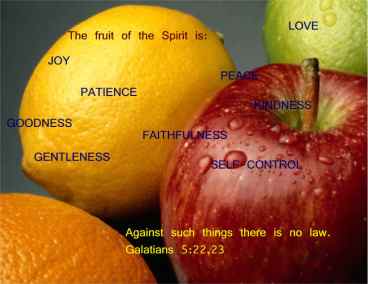The apostle James devoted practically his whole epistle to the subject of faith — living faith, faith that always produces fruit. But he also revealed a much neglected truth that holds the key to living faith. He wrote, “Even so faith, if it hath not works, is dead” (Jas. 2:17).
While the epistle of James deals primarily with faith, the two epistles Peter wrote put the accent on hope; as for the apostle John, he, in his three letters, expounded on what love is.
These three virtues combined — faith, hope and love — reveal to us the works of faith.
Interestingly enough, the apostle Peter groups these works in three simple verses, as he writes: “And beside this, giving all diligence, add to your faith virtue; and to virtue knowledge; And to knowledge temperance; and to temperance patience; and to patience godliness; And to godliness brotherly kindness; and to brotherly kindness charity” (II Pet. 1:5-7).
Do you actually understand the full meaning of these words? Peter mentions seven supplements — seven important works — that are to be added to faith. These seven works make our faith a living faith, not a dead one.
In any language, words are used to express ideas, but they often have different connotations in people’s minds. God expresses His ideas through the Bible. We must therefore grasp the spiritual intent of His words to fully understand the Bible’s meaning.
Virtue
Peter wrote, under God’s inspiration, that the first supplement to faith — the first of the required works — is virtue.
In the original Greek, this word appears four times in the New Testament, but it is not always translated “virtue” in the various English versions. Some translate it as “excellence,” “strength,” “right conduct” or even “wonderful deeds.”
In essence you must conduct yourself according to God’s way in order to have living faith. You must show courage and strength, and you must excel in your task.
Peter also wrote, “Ye are a chosen generation, a royal priesthood, an holy nation, a peculiar people; that ye should shew forth the praises of him who hath called you out of darkness into his marvellous light” (I Pet. 2:9). Here the same Greek word that is elsewhere translated as “virtue” is rendered “praises.”
Interesting, isn’t it? The words “praise” and “wonderful deeds” (Revised Standard Version) are used as equivalents of the Greek word elsewhere translated “virtue.”
Therefore, to have living faith (remember, “Faith without works is dead” — James 2:26), you must produce “wonderful deeds” or have a “praiseworthy conduct” in God’s sight. That’s what God wants you to do.
Knowledge
Let us now examine the second work that must be added to your faith to make it live. Peter states, “And beside this, giving all diligence. add … to virtue knowledge” (II Pet. 1:5).
Why should knowledge come right after virtue? The answer is obvious: to enable us to rightly determine just what are good and praiseworthy deeds. That knowledge only comes from God.
Consequently, you need to study the Bible and learn what God wants you to do. Your deeds must be evaluated by His standards and not your human standards. Without divine revelation, you cannot have this essential knowledge.
Today humanity as a whole has much knowledge of material things, but is lamentably ignorant of spiritual truths. Men can send highly sophisticated spacecraft into space and take remarkable pictures of the planets. Astronauts can set foot on the moon and return to earth safely.
Nevertheless, that kind of knowledge, however awe-inspiring, does not produce living faith. It cannot save a person. Your faith must be supplemented with the knowledge of God’s will and His ways.
“My people are destroyed for lack of knowledge,” says your Creator. “Because thou hast rejected knowledge, I will also reject thee, that thou shalt be no priest to me: seeing thou hast forgotten the law of thy God, I will also forget thy children” (Hos. 4:6).
The prophet Micah clearly shows what is the true knowledge that needs to be added to your faith: “He [God] hath shewed thee, O man, what is good; and what doth the Lord require of thee, but to do justly, and to love mercy, and to walk humbly with thy God” (Mic. 6:8).
Simple and beautiful words, provided you grasp their spiritual intent. To do justly is to live by every word that proceeds out of God’s mouth; to love mercy is to be good to your neighbor — to love him as you love yourself; to walk humbly with God is to do His will, and to have no other gods before Him.
Unfortunately, ever since the beginning, the world has rejected this knowledge.
Temperance
After supplementing your faith with virtue and knowledge, you must exercise temperance or self-control. “And beside this, giving all diligence, add … to knowledge temperance” (II Pet. 1:5-6).
Of what value can knowledge be if you don’t put it to use — or if you lack self-control? More often than not, people know what they are supposed to do, but they lack the character to do it.
Misuse of anything leads to sin. For instance, there’s nothing wrong with eating and drinking. But too much eating and drinking can be sin.
Do you now see why God wants you to add to your faith — as a working part of it — self-control? You must learn to resist temptation, to stop before you come anywhere near breaking God’s law.
The best and surest way to resist temptation is to get closer to God, but you can only get closer to Him by doing His will. That’s having self-control or temperance.
God’s Spirit in you will give you all the help you need, because “the fruit of the Spirit is love, joy, peace, longsuffering, gentleness, goodness, faith, meekness, temperance” (Gal. 5:22-23).
Patience
To virtue, which is good conduct or praiseworthy deeds, you must add godly knowledge; to knowledge, self-control or temperance in order to resist evil; and to self-control, steadfastness or patience (II Pet. 1:6).
Patience is one of the most important — and one of the hardest — things to practice. Without it you cannot grow in grace and knowledge, practice virtue, acquire knowledge or exercise self-control.
That’s why the apostle James wrote: “My brethren, count it all joy when ye fall into divers temptations; Knowing this, that the trying of your faith worketh patience. But let patience have her perfect work, that ye may be perfect and entire, wanting nothing” (Jas. 1:2).
To one degree or another we all lack patience. We often get upset and irritated when others don’t do what they are supposed to do, but we are very tolerant with ourselves.
How grateful we should all be to God that He does not lose patience as we do!
To have patience is to set your ideas, your goals, your mind on positive things — with faith — all the time. Patience never gives up, no matter what. It enables you to remember that God loves you and that He always knows what’s best for you.
Throughout history, all the people of God and every disciple of Christ had to learn to be patient. true Christians must not forget that God’s timing is always best, and that our faith is strengthened when we patiently wait on Him.
Godliness
Just what is godliness (II Pet. 1:6)? How does the Bible define it?
To be godly is to have a godlike attitude. You must learn to gradually think like God and behave like Him. God commands you to “lead a quiet and peaceable life in all godliness and honesty” (I Tim. 2:2).
Indeed, you have to endeavor to be godly and respectful in every way — to think and act as God does — to be patient and kind as He is. Unfortunately, the much misunderstood words pious or piousness have been substituted for godliness in some English versions of the Bible, and people are confused.
Godliness is synonymous with true Christianity or true religion. In fact, in the Revised Standard Version, this is how the same Greek word has been translated in I Timothy 2:10: “But by good deeds, as befits women who profess religion [godliness].”
As you can see, to practice godliness is to have godlike religion — the true religion. Faith without godliness is dead.
Kindness
The “brotherly kindness” mentioned in this verse is translated from the Greek word philadelphia, which literally means “brotherly love.” This love is one of the works of your living faith. Philia love is the love of friendship—brotherly love—love of parent, or child. Strong’s Concordance says it means “to have affection for (denoting personal attachment, as a matter of sentiment or feeling).”
Though philia and agape are related in many ways, there is a fundamental and distinct difference between the two. Man can express philia love, but not agape. Philia love is prompted by a sense of emotion. God’s love is not an emotion. The simple difference is this: All men can express philia whereas agape love is attained by choice. God made us free moral agents. He gave us minds to direct our actions. For right actions, we must submit to His law of love by choice. Doing so will bring us happiness. But it also requires that we go against what is normal or natural for the carnal man.
All men were created with a natural love toward self. Remember, we are commanded to love neighbor as self. Philia love can be an unselfish, outflowing love, but only when combined with the agape love God gives you.
But for the most part, philia love is something man, without God’s Spirit can express, because it revolves around self. It means “fraternal affection, brotherly love”; in other words, the natural affection you have for those who relate to you in a special way.
Love
The final supplement — the seventh work — to living faith that Peter lists is charity, or the love of God (II Pet. 1:7). God’s love is concerned about that neighbor who is the absolute farthest away from any kind of natural, brotherly affection. Jesus said, “Love your enemies, bless them that curse you, do good to them that hate you, and pray for them which despitefully use you, and persecute you” (Matthew 5:44). This kind of love is much more than just a natural affection you might have for those closely related to you. It is more than philia.
Do you really love everyone, including your enemies? Don’t you sometimes criticize others, see the evil in them, overlook their good deeds? Don’t you judge them instead of being a light to them?
Without question, there is much wrong in the world, and you, as a Christian, should not be a part of it, nor should you judge it. The whole world today desperately needs God’s Kingdom to come. Christ didn’t only die for His true followers. He died for every single human being.
Conclusion
Examine your heart. Is your faith truly supplemented with the seven works the apostle Peter mentions in this section of his second epistle?
In concluding this section, Peter wrote, “Wherefore the rather, brethren, give diligence to make your calling and election sure: for if ye do these things [if you practice these works of faith], ye shall never fall” (II Pet. 1:10).
What a tremendous promise! If you have living faith — faith supplemented with these seven works — you will never, never fall. You will never give up. “For so an entrance shall be ministered unto you abundantly into the everlasting kingdom of our Lord and Saviour Jesus Christ” (verse 11).
That’s your precious, ultimate reward. Let your faith be truly supplemented with the works of the Holy Spirit!
Research Source: The Good News, February 1982






